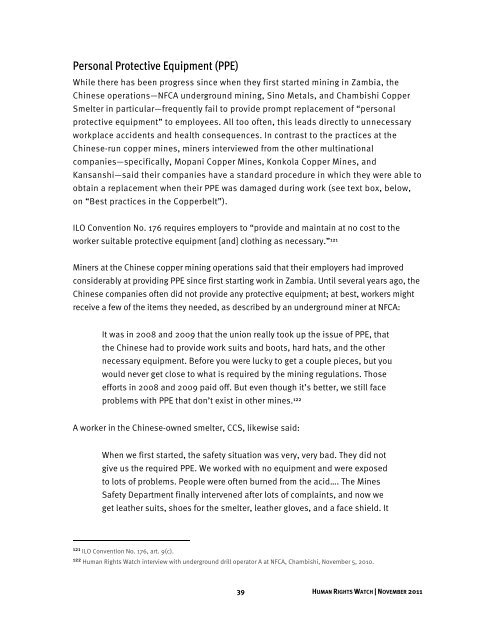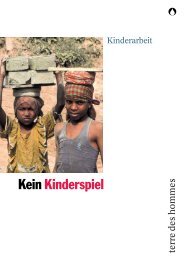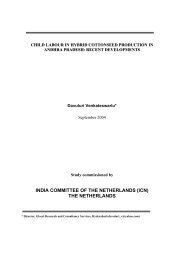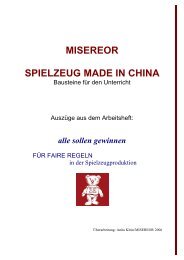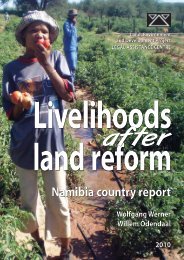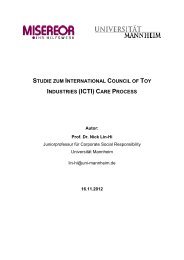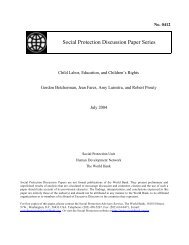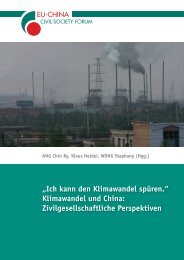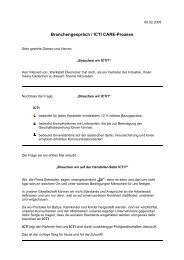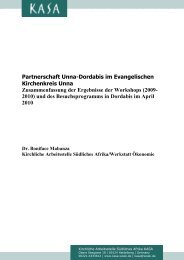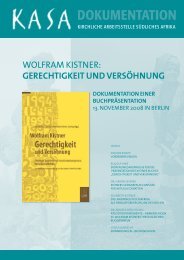“You'll Be Fired if You Refuse†- Human Rights Watch
“You'll Be Fired if You Refuse†- Human Rights Watch
“You'll Be Fired if You Refuse†- Human Rights Watch
You also want an ePaper? Increase the reach of your titles
YUMPU automatically turns print PDFs into web optimized ePapers that Google loves.
Personal Protective Equipment (PPE)<br />
While there has been progress since when they first started mining in Zambia, the<br />
Chinese operations—NFCA underground mining, Sino Metals, and Chambishi Copper<br />
Smelter in particular—frequently fail to provide prompt replacement of “personal<br />
protective equipment” to employees. All too often, this leads directly to unnecessary<br />
workplace accidents and health consequences. In contrast to the practices at the<br />
Chinese-run copper mines, miners interviewed from the other multinational<br />
companies—spec<strong>if</strong>ically, Mopani Copper Mines, Konkola Copper Mines, and<br />
Kansanshi—said their companies have a standard procedure in which they were able to<br />
obtain a replacement when their PPE was damaged during work (see text box, below,<br />
on “<strong>Be</strong>st practices in the Copperbelt”).<br />
ILO Convention No. 176 requires employers to “provide and maintain at no cost to the<br />
worker suitable protective equipment [and] clothing as necessary.” 121<br />
Miners at the Chinese copper mining operations said that their employers had improved<br />
considerably at providing PPE since first starting work in Zambia. Until several years ago, the<br />
Chinese companies often did not provide any protective equipment; at best, workers might<br />
receive a few of the items they needed, as described by an underground miner at NFCA:<br />
It was in 2008 and 2009 that the union really took up the issue of PPE, that<br />
the Chinese had to provide work suits and boots, hard hats, and the other<br />
necessary equipment. <strong>Be</strong>fore you were lucky to get a couple pieces, but you<br />
would never get close to what is required by the mining regulations. Those<br />
efforts in 2008 and 2009 paid off. But even though it’s better, we still face<br />
problems with PPE that don’t exist in other mines. 122<br />
A worker in the Chinese-owned smelter, CCS, likewise said:<br />
When we first started, the safety situation was very, very bad. They did not<br />
give us the required PPE. We worked with no equipment and were exposed<br />
to lots of problems. People were often burned from the acid…. The Mines<br />
Safety Department finally intervened after lots of complaints, and now we<br />
get leather suits, shoes for the smelter, leather gloves, and a face shield. It<br />
121 ILO Convention No. 176, art. 9(c).<br />
122 <strong>Human</strong> <strong>Rights</strong> <strong>Watch</strong> interview with underground drill operator A at NFCA, Chambishi, November 5, 2010.<br />
39 HUMAN RIGHTS WATCH | NOVEMBER 2011


